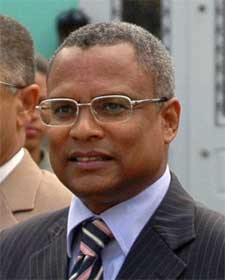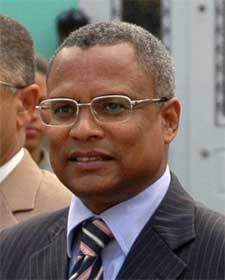 Visit coincides with anniversary of student protest at Taft Hall
Visit coincides with anniversary of student protest at Taft Hall
KINGSTON, R.I. – November 6, 2008 – As it remembers a key time in its history, the University of Rhode Island welcomes Prime Minister and Head of Government of the Republic of Cape Verde Jose Maria Pereira Neves to its campuses for a series of events Monday, Nov. 10.
The prime minister will be part of a discussion on Higher Education and the African Diaspora (Cape Verde) on the Feinstein Providence Campus at 7:30 p.m. The visit was organized by the Alan Shawn Feinstein College of Continuing Education, in conjunction with the African and African-American Studies program, the Multicultural Center and the multicultural student organizations at URI. In addition to the discussion in the Paff Auditorium, the prime minister and other ambassadors from Cape Verde will meet with leaders from the URI and Cape Verdean community, as well as students.
With a large Cape Verdean population throughout Rhode Island and Massachusetts, the relationship between URI and Cape Verde is a natural. Academic courses through the African and African-American Studies Program have strengthened the school’s relationship with the archipelago.
“The University of Rhode Island has had a long, productive relationship with Cape Verde,” said John McCray, vice provost for urban programs. “We have been sending students there for several years through summer travel programs for educational experiences.”
In addition to the discussion at the Feinstein Providence Campus, the Prime Minister and his party will arrive on the Kingston campus at 3 p.m. to meet with URI President Robert L. Carothers and other campus leaders. At 4 p.m., he will go to the Multicultural Center for a question-and-answer session with students. The Multicultural Center, built in 1998, is home to the Antonio “Toney” DaMoura Student Meeting Room, which was dedicated in his memory in May 2007.
A leader at URI and in the Cape Verdean community, the late DaMoura was the founder of URI’s Cape Verdean Student Association and a major part of the Talent Development program at the school. DaMoura’s memory will be honored in conjunction with the anniversary of a non-violent student protest on the Kingston campus.
DaMoura and fellow URI alumnus Malcolm Anderson were student leaders in the November 1992 protest by the Black Student Leadership Group in which students conducted a non-violent takeover of Taft Hall in an effort to improve the racial culture at the school.
“Toney epitomized strength and consistency,” Anderson said. “He was tireless in his efforts for all students. He had a vision for this school, and it is only because of his vision that we have the ambassadors coming to the school.”
In 1992, a series of events caused racial tensions on campus to rise. In October, two quotations from Malcolm X were inscribed on the façade of the then-newly renovated library. However, the quotes were incomplete. The inscription was the final straw for many students, who organized a retreat to discuss the campus culture.
“We wanted to develop a sense of belonging on campus,” Anderson said. “When you are a student of color on a white majority campus, a lot of things feel foreign to you. It was important for us to talk and share our experiences, so we all knew we were not alone.”
The students planned and executed a non-violent protest in Taft Hall to voice concerns about racism and present a 14-point action agenda in a meeting with URI President Dr. Robert Carothers. As a result of those discussions, the school developed a major in the African and African-American Studies Program and established an annual black student leadership conference. In 1998, the Multicultural Center was opened in the center of campus.
At the time of the protest, the student body was comprised of 7.3 percent multicultural students and 80.6 percent Caucasian, with 12.1 percent non-reporting. By October of 1998, the multicultural population had increased to 11.5 percent, with 76.5 percent Caucasian and 12 percent non-reporting. Over the same span, the multicultural faculty increased from 9.5 percent to 13.8 percent.
“Progress is something that is monitored and watched,” Anderson said. “Our goal was to provide a platform for people the way that others did for us. What we wanted was not just progress for ourselves, but progress for everyone.”
Anderson, who is finishing his master’s degree in education administration at Trinity University in Washington, D.C., will return to Rhode Island for the Prime Minister’s visit.
“It makes you feel special, that the work we did was for a reason,” said Anderson, who stressed the need for student groups to continue working together. “At the time, I understood that it was not about me, but about we. We needed to elevate concerns that were being felt by many students.”

